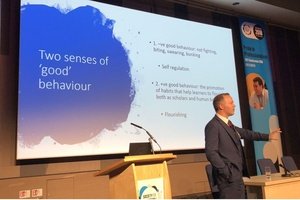Laws introduced to Queensland parliament last month are looking to overhaul the disciplinary system used in schools and the way children are home-schooled.
The reforms are now being debated by a parliamentary committee with submissions by a range of education and youth experts.
One of the changes is to school suspensions and expulsions to improve procedural fairness and give parents the right to appeal consecutive short disciplinary measures.
In 2022, there were more than 72,000 short suspensions (up to 10 days) and more than 1500 exclusions recorded by Queensland public schools.
Experts are calling for amendments to go further and make suspension or expulsion an absolute last resort, because they say time away from school correlates with criminal involvement.
“What we see is a very strong link with school disciplinary absences and a strong link with the bad behaviour that they engage in to get them into the youth justice system,” Katherine Hayes, chief executive of Youth Advocacy Centre, told the hearing on Thursday.
She said it becomes a systemic issue once a child is suspended because a lack of engagement with education can lead to a cycle of possible criminal behaviour, especially in regional areas.
“These kids float into the youth justice system and become entrenched because there’s no engagement with education,” Hayes said.
The safety of students and teachers remains a priority but experts are calling for education support to go further before kids are expelled.
Matilda Alexander, chief executive of Queensland Advocacy for Inclusion, said nearly every child in youth detention has first been excluded from school.
“Every child has a right to learn. Let’s keep our kids in schools,” she said.
Youth support groups want to see the bill legislate multi-tiered systems of support between education, community and government support organisations as well as limiting the number of suspensions in a certain period.
But teacher representatives fear the amendments, including the right to appeal cumulative suspensions, will impact already stretched resources and undermine decision making by principals.
“If students were to remain in schools whereby they were unsafe, we risk the safety of all of our staff and students in our schools,” Brisbane South State Secondary College principal, Kirsten Ferdinands, told the hearing.
Ferdinands said schools need to be better resourced to cope with the legislative changes.
The proposed laws also include changes to require home-schooled children to follow the Australian curriculum, after a 200 per cent rise in the past four years, which were debated during the committee hearing on Thursday.
AAP
















